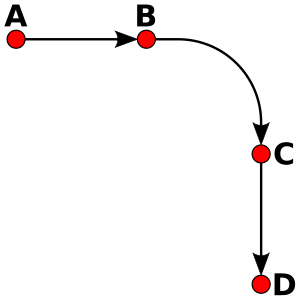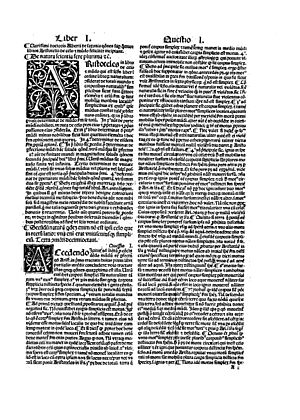Albert of Saxony (philosopher) facts for kids
Quick facts for kids
Albert of Saxony
|
|
|---|---|
| Born | c. 1320 Rickensdorf near Helmstedt
|
| Died | 8 July 1390 Halberstadt
|
| Alma mater | University of Prague College of Sorbonne, Paris |
| Era | Medieval philosophy |
| Region | Western philosophy |
| School | Nominalism |
|
Main interests
|
Logic, natural philosophy, theology |
|
Notable ideas
|
Supposition theory |
|
Influences
|
|
Albert of Saxony (whose Latin name was Albertus de Saxonia) was a smart German thinker and mathematician. He lived from about 1320 to 1390. He is famous for his ideas about logic (how we reason) and physics (how things move and work). Later in his life, he became a bishop in a city called Halberstadt.
Contents
Life Story
Albert was born in a small village called Rickensdorf, near Helmstedt. His father was a farmer. Because Albert was very talented, he got to go to big universities. He studied at the University of Prague and the University of Paris.
In Paris, Albert became a master of arts, which is like being a professor. He taught there from 1351 to 1362. He also studied theology (the study of religion) at the College of Sorbonne. In 1353, he was chosen as the rector (the head) of the University of Paris.
After 1362, Albert went to see Pope Urban V in Avignon, France. He was sent by Rudolf IV, Duke of Austria to help start a new university in Vienna. His talks were successful! Albert then became the very first rector of the University of Vienna in 1365.
In 1366, Albert was chosen to be the bishop of Halberstadt. This was the area where he was born. As bishop, he joined forces with Magnus with the Necklace, Duke of Brunswick-Lüneburg. They fought against Gebhard of Berg, who was the Bishop of Hildesheim. Albert was even captured by Gebhard in a battle in 1367.
Albert of Saxony passed away in Halberstadt in 1390.
His Ideas
Albert was a student of a famous thinker named Jean Buridan. Buridan's ideas about physics and logic really influenced Albert. Albert helped spread these ideas about natural philosophy (the study of nature) from Paris to places like Italy and central Europe.
Like his teacher, Albert was good at looking closely at how we use language and how we know things. He thought about what is truly impossible and what is only impossible in the "normal course of nature."
Albert is known as one of the main followers of nominalism. This idea suggests that general concepts, like "tree," are just names we give to individual things, not separate real things themselves. His writings were very popular and helped make his ideas, and those of his teachers, known to many people.
Albert's work in logic was also greatly influenced by William of Ockham. He wrote about Ockham's ideas on logic.
One of Albert of Saxony's most important ideas in physics was the theory of impetus. This theory tried to explain why things keep moving after they are thrown. It was a step towards our modern understanding of inertia (the idea that an object will stay in motion unless a force stops it).
Albert's theory of impetus had three stages:
- First stage: When you throw something, it moves in a straight line. This is because of the "impetus" (a kind of force) you gave it. Gravity doesn't have much effect yet.
- Second stage: As the object moves, air resistance slows it down. Gravity starts to pull it downwards, so its path begins to curve.
- Third stage: All the "impetus" is used up. Now, only gravity pulls the object straight down until it lands.
Albert's book, Perutilis logica (which means "Very Useful Logic"), was a popular textbook around 1360. It explained logic in a clear way and built on Ockham's ideas. Albert believed that words get their meaning by referring to individual things. He also followed Ockham's ideas about universals (general concepts) and supposition theory (how words refer to things in different ways).
Albert also wrote a large collection called Sophismata. In this book, he looked at tricky sentences that were hard to understand because of certain words like "all," "some," or "not." These words change the meaning of other words in a sentence. He showed that a sentence itself has a meaning, not just the words in it. This helped him explain ideas about truth and solve paradoxes (like "This statement is false").
His writings on Aristotle's Physics were read by many people. They helped spread the ideas from Paris to Italy. His comments on Aristotle's De caelo (about the heavens) also became very popular. Albert's Treatise on Proportions was important for understanding how proportions apply to motion.
Albert also wrote about ethics (right and wrong) and economics, but these writings are not as well known. He also wrote some short mathematical texts.
Albert of Saxony was not just someone who copied others' ideas. He was very good at creating his own original proofs and ideas in logic and physics. He played a key role in sharing important scientific and philosophical ideas across Europe.
Works
Here are some of the important books and writings by Albert of Saxony:
- Perutilis Logica Magistri Alberti de Saxonia (Very Useful Logic)
- Albert of Saxony's Twenty-Five Disputed Questions on Logic
- Quaestiones in artem veterem
- Quaestiones on the Posterior Analytics
- Quaestiones logicales (Logical Questions)
- Sophismata et Insolubilia et Obligationes
- Expositio et quaestiones in Aristotelis Physicam ad Albertum de Saxonia attributae (Comments and Questions on Aristotle's Physics)
- Questiones subtilissime in libros Aristotelis de caelo et mundo (Very Subtle Questions on Aristotle's Books about Heaven and Earth)
- Alberti de Saxonia Quæstiones in Aristotelis De cælo (Albert of Saxony's Questions on Aristotle's On the Heavens)
- De latudinibus
- De latitudinibus formarum
- De maximo et minimo
- De quadratura circuli (Question on the Squaring of the Circle)
- Tractatus proportionum (Treatise on Proportions)
See also
 In Spanish: Alberto de Sajonia para niños
In Spanish: Alberto de Sajonia para niños
 | John T. Biggers |
 | Thomas Blackshear |
 | Mark Bradford |
 | Beverly Buchanan |



